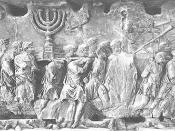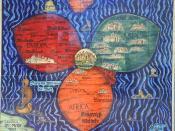For 3000 years Jerusalem, the capital of Israel, has played a role in Jewish and world history. In 1000 B.C.E., King David captured Jerusalem from Jebusites and turned Jerusalem into a great city. After David's death, in the 10th century B.C.E., Solomon, his son, built the Temple of God in the Mount Moriah, and Jerusalem became the capital of the Hebrews. In 586 B.C. the city fell to Babylon and the Temple was destroyed. After 50 years, in 536 B.C.E., Jerusalem was restored to the Hebrew rule again, and the Temple of God was rebuilt ("A Biblical History," n.d.).
During the next 500 years Jerusalem was attacked many times. For example, Seleucids, Greeks, Romans, Arabs, etc. conquered the city and tried to assimilate the Jews to their culture and religion ("The History of the City," n.d.). It appears that Jerusalem has not been just a holy place for these religions, but it has also been a dangerous flashpoint of conflicts.
Throughout history, the Jewish People has maintained a presence in Jerusalem, ever since King David established the city as his capital nearly 3,000 years ago. Except for a very few periods, when they were forcibly barred from living in the city by foreign conquerors, Jews have always lived in Jerusalem. ("The History of Jerusalem," n.d., para. 5) Through the ages Jerusalem's unique position among cities of the
world derives from its crucial role in religious history as a Holy City for three great religions: Judaism, Islam, and Christianity. The Western Wall in the Old City, which is the last remaining wall of the Jewish Temple, is the object of Jewish veneration. For Muslims, Jerusalem is the site of Prophet Mohammed's ascension to heaven. For Christians, Jerusalem is an important city, as well. It is the place where Jesus lived, preached,


